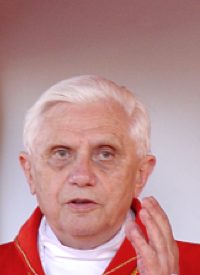
As many Catholic dioceses across America step up their efforts to protect the unborn and defend traditional marriage and family, Pope Benedict XVI (left) is warning Catholic Church leaders to prepare for a protracted conflict against forces committed to a “radical secularism” which threatens not only the Christian faith, but the world as a whole.
Speaking to a group of U.S. bishops visiting the Vatican for spiritual renewal, the Pope said that the moral consensus that helped to define America and lead it over the last 200 years is being significantly eroded “in the face of powerful new cultural currents which are not only directly opposed to core moral teachings of the Judeo-Christian tradition, but increasingly hostile to Christianity as such.”
These cultural currents, he said, whether opposing the Christian faith in the name of “scientific rationality” or through the manipulation of political power, “represent a threat not just to Christian faith, but also to humanity itself and to the deepest truth about our being and ultimate vocation, our relationship to God.”
He advised the Catholic Church shepherds that when a society tries to suppress the mystery of the gospel and to close the door to its transcendent truths, that culture “inevitably becomes impoverished and falls prey, as the late Pope John Paul II so clearly saw, to reductionist and totalitarian readings of the human person and the nature of society.”
The Pope counseled that the Catholic Church has a “critical role” in standing firm against cultural currents that promote “extreme individualism” detached from the eternal truth of the faith. He said that the church’s defense of moral reasoning is based on a “natural law” that “enables us to understand ourselves and the truth of our being, and so to shape a more just and humane world.”
He emphasized the attempts by government “to limit that most cherished of American freedoms, the freedom of religion,” adding that many bishops had “pointed out that concerted efforts have been made to deny the right of conscientious objection on the part of Catholic individuals and institutions with regard to cooperation in intrinsically evil practices. Others have spoken to me of a worrying tendency to reduce religious freedom to mere freedom of worship without guarantees of respect for freedom of conscience.”
While not specifying the issues, the Pope was no doubt referring to the aggressive efforts to normalize homosexuality through legalizing same-sex marriage and the pressure coming from the Obama administration for Catholic institutions to cave in to his “contraception mandate.” Among those who have taken a high-profile stand against those efforts is New York Archbishop (and Cardinal-designate) Timothy Dolan. While in 2009 Dolan offered little more than lip service to efforts to protect marriage, as his own New York State fell to homosexual marriage in June of last year, the bishop has stepped up to lead the Catholic Church in defending traditional values.
In late 2011, under the leadership of Dolan, the U.S. Conference of Catholic Bishops (USCCB) launched an Ad Hoc Committee on Religious Liberty. Dolan followed up that effort a month later by banning same-sex marriage ceremonies at Catholic facilities in New York.
And in September the archbishop sent a letter to President Obama warning him that his administration would “precipitate a national conflict between church and state of enormous proportions” if it did not “end its campaign against DOMA [the Defense of Marriage Act], the institution of marriage it protects, and religious freedom.”
Most recently, as reported by The New American, Dolan took a public stand against efforts by the Obama administration to force religious institutions to include free birth control — including such medications as the RU-486 “abortion pill” — in their insurance coverage. Even as the White House announced that it would attempt to coerce Christian institutions to violate their convictions on this issue, the archbishop noted that the President had “drawn an unprecedented line in the sand” in challenge to people of faith, and declared that the Catholic Church’s leadership was “committed to working with our fellow Americans to reform the law and change this unjust regulation.”
In his comments to the U.S. bishops, the Pope emphasized the need for a committed and courageous laity that is prepared to take a bold stand against the secular agenda “which would de-legitimize the Church’s participation in public debate about the issues which are determining the future of American society.” He also encouraged the bishops to continue holding the feet of reluctant Catholic politicians and public leaders to the fire of their faith, helping them to “understand their personal responsibility to offer public witness to their faith, especially with regard to the great moral issues of our time: respect for God’s gift of life, the protection of human dignity, and the promotion of authentic human rights.”
While Archbishop Dolan did not travel to Rome with the U.S. bishops, he issued a statement thanking the Pope for speaking “eloquently and powerfully on the threats to the church’s moral witness in public life.”
Similarly, Bishop William Lori of Bridgeport, Connecticut, chairman of the USCCB’s Ad Hoc Committee on Religious Liberty (and also the Supreme Chaplain of the Knights of Columbus), said that the bishops were encouraged by the pope’s comments. “His words reflect the longstanding teaching of the Church,” said Lori, “… that all people have a right not to be coerced to violate their religious beliefs.”


